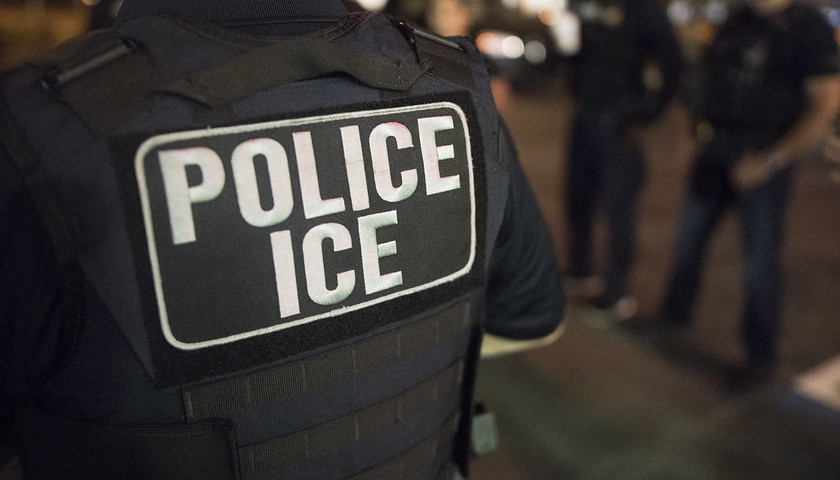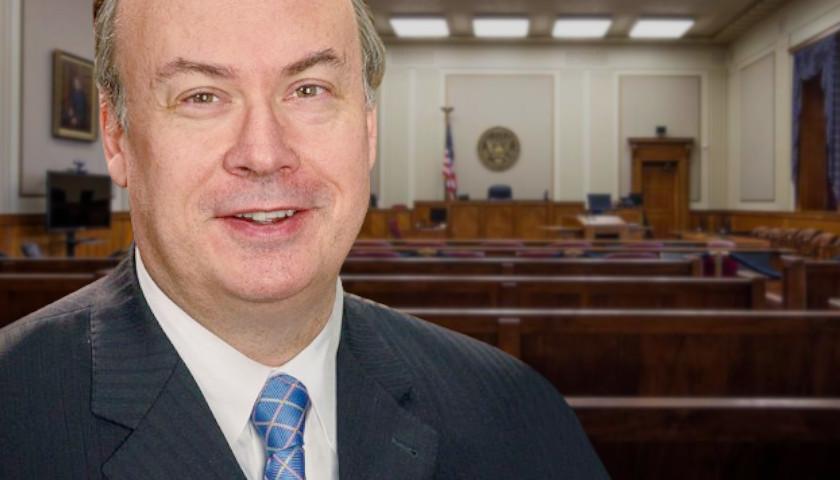by Debra Heine
Homeland Security Secretary Alejandro Mayorkas has introduced a plan to “reorganize” ICE’s Enforcement and Removal Operations to the point where it will no longer be about enforcing the nation’s immigration laws, the Washington Times reported.
The Cuba-born Mayorkas floated this plan to essentially “abolish ICE” last week during a telephone conference call with agency personnel in Texas, according to the Times’ sources, who claimed Mayorkas proposed “taking members of the country’s 4,000-strong deportation force off the streets and converting them into criminal investigators.”
ICE announced on Monday that it is “implementing interim operating guidance that will temporarily govern its civil immigration enforcement and removal operations, until Secretary of Homeland Security Alejandro Mayorkas issues new enforcement guidelines for the Department.” Mayorkas is reportedly expected “to issue new enforcement guidelines in less than 90 days, after consultation with Department personnel and external stakeholders.”
Deportation officers told the Times that the move would be “akin to a city police department converting its beat cops to detectives, leaving nobody to patrol the streets for basic crimes.”
“This is an administrative abolishment of ICE as we currently know it,” one source said.
With the focus off of enforcing immigration laws, arrests and deportations of illegal immigrants would undoubtedly plummet.
Abolishing ICE has been a top goal of immigrant rights activists, Communists, antifa radicals and Democrat office holders for the past several years.
Antifa groups Denver Communists, Abolish ICE, National Lawyers Guild & others are organizing an event to confront the ICE facility administrator & his family at their home in Aurora, Colorado this week. The group is recruiting people on Facebook. pic.twitter.com/CHpXuE2iRR
— Andy Ngô (@MrAndyNgo) September 17, 2019
fuck it, new york. if they're gonna call this city an "anarchist jurisdiction" might as well hoist up the black flag, give the land back, abolish capitalism, destroy the prisons, abolish ice, and work together to make sure our individual and collective needs are met.
— New York City Antifa (@NYCAntifa) September 3, 2020
More chants from the #Portland open borders protest: "F— DHS!" "Abolish ICE." #Antifa pic.twitter.com/sBoMa9KmfM
— Andy Ngô (@MrAndyNgo) November 8, 2018
Mayorkas, in his telephone meeting, left many questions unanswered, according to the The Times’ sources, including questions about new training and potential changes in pay.
Tae Johnson, acting director at U.S. Immigration and Customs Enforcement, was also part of the conversation and agreed with Mr. Mayorkas’ direction, one source said.
What exactly Mr. Mayorkas is planning is not clear. He told those in the meeting that he thought deportation officers are under the wrong pay scale but did specifically promise a raise.
Only a small percentage of immigration offenders are ever prosecuted criminally, and most of those are border cases, Jessica Vaughan, policy studies director at the Center for Immigration Studies, (CIS) told the Times.
Vaughan added: “By eliminating the option of removing people on administrative charges, Mayorkas will be eliminating ICE’s ability to enforce immigration laws, and as a side effect, eliminating ICE’s ability to use its immigration authorities to target all manner of criminals, smugglers, gang members, fraudsters and any other illegal alien who is causing problems here.”
Converting immigration officers into criminal investigators undermines the system and effectively sets ICE up “to fail in its mission,” she said.
Mayorkas’ appointment was approved in the Senate last month by a 57 to 42 margin despite the many serious ethical lapses that litter his public service record. Under former president Obama he served as the head of the United States Citizenship and Immigration Services (USCIS) from 2009-2013, and then as deputy secretary for the Department of Homeland Security (DHS) from 2013-2016.
After the 2016 election he worked for a blue-chip law firm in Washington, D.C. where he received $3.3 million representing a defense contractor accused “of kickbacks to secure a Department of Energy contract and a utility company found responsible for an explosion that killed one person in Massachusetts,” the Daily Caller reported.
During the Obama years, Mayorkas was known for “using strong-arm management tactics to spike acceptances of immigration and asylum applications in disregard of eligibility,” the Center for Immigration Studies reported.
In October 2010, about a year after Mayorkas’s appointment to head USCIS, Sen. Chuck Grassley (R-Iowa) penned a complaint to then-DHS Secretary Janet Napolitano. Its contents, though a decade old now, raise questions about Mayorkas’s fealty to immigration and asylum law enforcement.
The Grassley letter, citing anonymous employee allegations, accused the top USCIS official of laying heavy-handed pressure on career employees to squeeze out higher volumes of immigration application approvals for the agency’s “customers”, while undermining fraud and ineligibility detection efforts.
After receiving an “inadequate response” from Mayorkas, Grassley’s office interviewed seven employees, examined hundreds of pages of supporting documents, and presented the results in the letter to Secretary Napolitano.
“Unfortunately, the evidence suggests that Director Mayorkas is fostering an environment that pressures employees to approve as many applications as possible and condones retaliation against those who dissent,” he wrote.
Among Grassley’s chief findings:
• Mayorkas had become “visibly agitated” during a visit to USCIS’s California offices when told employees there wanted to root out fraud. “Why would you be focusing on that instead of approvals?” he reputedly demanded. A witness said “his message was offensive to a lot of officers who are trained to detect fraud.”
• At a management conference, Mayorkas directed top officials to find ways always to “get to yes” regarding “customer” immigrants who filed visa applications. He told his subordinates to “look at petitions from the perspective of the customer” and that the goal was “zero complaints”, implying that approvals were the means to that end.
• At a conference in Landsdowne, Va., Mayorkas said there were some “managers with black spots on their hearts” who can’t see their way to grant benefits and that he was “dealing” with them and also subordinates “too close” to them, with immediate involuntary re-assignments.
• The California USCIS office was told to abandon an important anti-fraud measure that checked for high-risk applicants on a government database, and fraud specialists had to stop investigating such applications.
A damning December 2015 GAO report found that Fraud Detection and National Security (FDNS) asylum fraud prosecutions “rarely, if ever, occurred during the Mayorkas years,” according to CIS.
It found that half of the eight USCIS field divisions had referred either one fraud case to U.S. attorney’s offices from 2010 to 2014 or none at all. One office reported that not a single referral had been accepted in the prior two years. Another reported that its U.S. attorney had accepted no asylum fraud referrals since 2010.
Besides strong-arming USCIS employees to “get to yes” instead of valid denials or fraud investigations, another reason for this dismal showing during Mayorka’s 2010-2013 USCIS years was that the very FDNS directorate heralded in the Post story was never allowed to refer cases to prosecutors, subpoena witnesses, or even carry guns.
Senator Mitch McConnell voted against Mayorkas earlier this month, citing the fact that he was found guilty of helping expedite visa requests for wealthy foreign investors when he was at Obama’s DHS.
“I’ve voted for several of President Biden’s mainstream cabinet nominees,” McConnell wrote on Twitter. “But his choice to run Homeland Security was blasted by the Obama administration’s own Inspector General for running an immigration law favor factory for powerful Democrats. Bad pick with major ethics issues.”
I’ve voted for several of President Biden’s mainstream cabinet nominees. But his choice to run Homeland Security was blasted by the Obama Administration’s own Inspector General for running an immigration law favor factory for powerful Democrats. Bad pick with major ethics issues.
— Leader McConnell (@LeaderMcConnell) February 2, 2021
The DHS Office of Inspector General (OIG) investigation reportedly centered around Mayorkas’s alleged interference in the fraud-riddled EB-5 visa program. According to CIS, wealthy foreigners could essentially achieve U.S. residency and eventual citizenship if they invested $500,000. That sum was reportedly raised to $900,000 during Mayorkas’ tenure.
The OIG case launched in 2012 on the strength of “an extraordinary number of DHS employees” who came forward to report that Mayorkas was providing “special access and special favors” to a handful of EB-5 visa applicants who were wealthy foreign national associates of powerful U.S. Democratic figures and office-holders doing the asking.
Many of the investors seeking EB-5 visas were Chinese nationals hoping to sink millions into:
• Film projects with connections to former Democratic Pennsylvania Governor Edward Rendell, the mayor of Los Angeles, and Hollywood businessmen in late 2011.
• A hotel and casino project in Las Vegas that was being pushed by U.S. Democratic Sen. Harry Reid in 2013 on behalf of some law clients of the senator’s son, Rory.
• An industrial investment fund’s proposed hybrid vehicle factory in Virginia promoted by former Virginia Governor Terry McAuliffe and Hillary Clinton’s brother, Anthony Rodham, from 2011 through 2013.The OIG concluded that in these three cases Mayorkas “exerted improper influence in the normal processing and adjudication” of the visas, “inserted himself in unprecedented ways” in the adjudication process, and “intervened with the career USCIS staff in ways that clearly benefited the stakeholders.
“In each of these three instances, but for Mr. Mayorkas’s intervention”, the report summary noted, “the matter would have been decided differently.”
None of the visa applicants would ever consent to OIG interviews, nor were the investigators ever able to find Mayorkas’s emails and internal communications.
Right after Mayorkas’ confirmation, ICE canceled Operation Talon, an operation that targeted illegal immigrants with convictions for sex crimes.
“On Wednesday, February 3rd, another email went out to the field shutting down the national Operation Talon, that sought to arrest at-large illegal aliens with sex crime convictions to include child molestation,” former ICE Director Thomas Homan told Fox News.
“Thousands of investigative hours go into planning for these operations from identifying targets, to locating them, to ensuring appropriate coordination with other law enforcement entities,” Homan said.
After Biden assumed office, DHS immediately tried to impose a 100-day moratorium on deportations — but that was blocked by a judge’s ruling in response to a lawsuit from Texas.
Homan told Fox that he obtained an email sent to agents that said ICE’s convictions priorities would generally “not include drug based crimes (less serious offenses), simple assault, DUI, money laundering, property crimes, fraud, tax crimes, solicitation, or charges without convictions.”
“You have to commit a serious felony and be convicted of it to be even prioritized for arrest and removal and that sends a message to the rest of the world,” Homan said. “If you can get by the Border Patrol, as long as you are not convicted of a serious felony after you’re here, you can stay — because ICE isn’t looking for you.”
– – –
Debra Heine reports for American Greatness.







